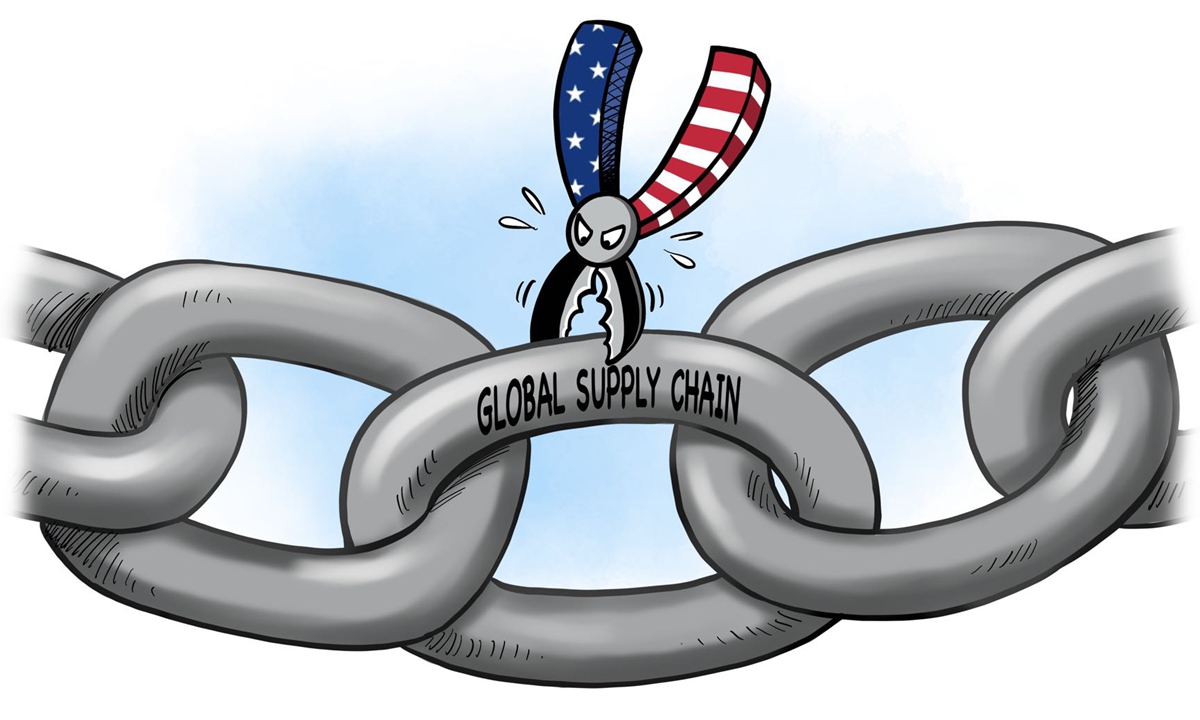
Illustration: Liu Rui/Global Times
Amid the US' push for a so-called economic decoupling, Western media outlets seem to become increasingly obsessed with discussions about which economy will replace China as the world's manufacturing hub. After finding that neither India nor Vietnam seems likely to achieve such a grand goal, the Economist, a UK-based magazine, recently came up with a bluffing portmanteau: Altasia.
Altasia is the shorthand for the alternative Asian supply chain composed of 14 economies that include Japan, South Korea, India, the Philippines, Indonesia, Singapore, Malaysia, Thailand, Vietnam, Laos, Cambodia, Bangladesh, Brunei, and China's Taiwan region. As a result of the widening geopolitical rift between China and the US, Altasia is believed to have the potential to provide alternatives to China's supply chains in the coming years, according to the Economist.
Topics involving the possibility of seeking an alternative to Chinese manufacturing in Asia have always attracted great attention, especially after the US has made it clear that it wants to shift its supply chain away from China. Both India and Vietnam were seen as the biggest beneficiaries of the US-China trade tensions, but when it comes to replacing China's manufacturing sector, there are many limitations including their relatively smaller market size, limited manufacturing capacity, slower technological development and market access restrictions.
Firstly, it must be pointed out that China is a staunch supporter of globalization and multilateral cooperation. Sound development in Asia is good news for China as well as the world. However, China opposes any attempt by the US or other countries to reshape the global division of labor through political maneuvers for selfish purposes. Such attempts not only run counter to market principles but also are futile.
If someone really believes that Altasia with their combined export scale and skilled labor force on par with China's could challenge the latter's status as the world's manufacturing center, just because some in the US or any other country for that matter want them to, they are engaged in idle talks that makes no economic sense at all.
If anything, China's advantages in global supply chains remain intact. China has a complete industrial system that makes it the only country in the world to encompass all the categories listed in the UN's industrial classification, with massive manufacturing capacity and market scale.
Moreover, China's infrastructure and logistics network is mature enough for great efficiency in the industrial chain, which is crucial for reducing overall costs compared with others. This is also what makes Altasia unlikely to artificially replace China's supply chains. Just considering the logistics, time, and compliance costs among various economies, without a high degree of connectivity, building such a supply chain seems more like a castle in the air.
Indeed, trying to build a unified market in Altasia won't be easy at all, even for the US. Because the economies have different political systems, demographic conditions, natural resources, languages, and religious beliefs and cultures, which could all lead to obstacles to improving connectivity and building a unified market. And it is highly questionable whether the US would be able to strengthen Asian's supply chain and to pit it against China.
Even if these economies become more connected in terms of logistics and infrastructure connectivity in the future, China will be an indispensable part of the process. The inevitable consequence of higher Asian economic integration will be closer linkage between manufacturing sectors of China and other economies, as taking advantage of China's massive manufacturing sector will be crucial for other Asian economies' development.
At present, with mounting pressure from the global economic downturn, the Asian supply chain is facing formidable challenges. In January, container exports to the US from 18 Asian economies declined by 20.1 percent year-on-year, reaching 1,468,276 TEUs, according to the Japan Maritime Center (JMC). This is not because certain supply chains have moved elsewhere, but because of sluggish global demand.
To be clear, any talks about replacing China's manufacturing sector is political rhetoric manufactured by arrogant forces in the US and some other Western countries who think they can reshape the global division of labor at will. The reality is that only market forces can change that. Moreover, such talks are no solution to the current deteriorating environment. The region needs to focus on enhancing the resilience of the overall industrial chains by strengthening cooperation, rather than falling victim of far-fetched theories like Altasia.




